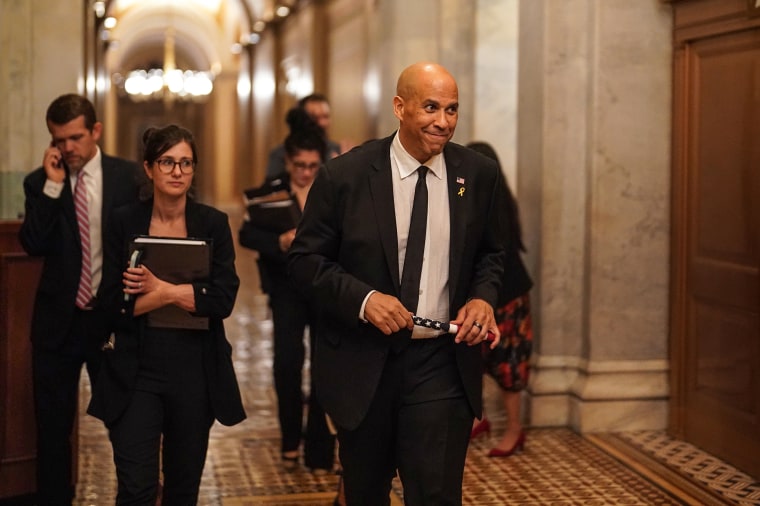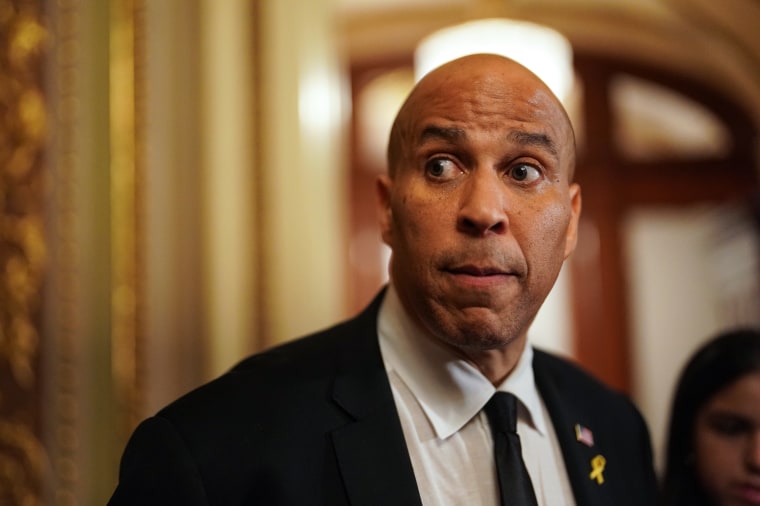WASHINGTON — Sen. Cory Booker, D-N.J., wanted to do something extraordinary. He knew Democratic voters were desperate for it.
So he took to the Senate floor with little fanfare and went on to deliver a marathon speech — excoriating the Trump administration for lawlessness and undermining American values and in the process breaking the record for longest Senate speech ever, yielding Tuesday after 25 hours and 5 minutes.
It was a cathartic moment for a vast swath of demoralized voters across the country, who tuned in amid hunger for some action by the opposition party beyond the traditions of business as usual.

And for a Democratic Party that has been lost in the wilderness since its bruising defeat to Donald Trump last fall, it offered a rare moment of hope to pursue what may be its only chance of slowing Trump down: inspiring a mass popular uprising against him.
“There’s a lot of people out there asking Democrats to do more and to take risks and do things differently,” an exhausted Booker told reporters after he walked off the floor. “This seemed like the right thing to do. And from what my staff is telling me, a lot of people watched. And so we’ll see what it is. I just think a lot of us have to do a lot more, including myself.”
Throughout Tuesday afternoon, Booker was trending across social media, including on TikTok, BlueSky and even Elon Musk's X.
The speech got over 350 million "likes" on Booker's TikTok livestream of his remarks, according to his office, including more than 300,000 people viewing them across his platform at once. It included over 200 stories from New Jerseyans and Americans. And it drew over 28,000 voicemails of encouragement on Booker's office phone line, along with public accolades from Democratic luminaries like former Vice President Kamala Harris and Rep. Nancy Pelosi, D-Calif., the former House speaker.

“Rank-and-file Dems are desperate for leadership and fighters,” said Ezra Levin, a co-founder of the progressive organization Indivisible, which has accused Democrats of being too passive against Trump.
Sen. Peter Welch, D-Vt., said Booker taught Democrats a lesson.
“He made the Senate relevant, and he captured the moment where people were focused on the why we have to push back and stand up against Trump, as opposed to the tactical day-to-day slog,” he said. “It was very inspirational.”Yet despite the reaction, Booker’s speech won’t end Trump’s attempts to dismantle the federal government or halt his agenda of tax cuts and mass deportations from barreling through the Republican-controlled Congress. The only specific Senate business it disrupted were votes on a resolution involving Trump’s tariffs and his nominee to be the U.S. ambassador to NATO.
After Booker finished, the GOP moved toward a vote on that nominee, Matthew Whitaker, prompting some outside liberals to say Democrats should treat it like an abnormal moment and object.
Democratic strategist Mike Nellis said that Booker’s move recognizes the political currency of the modern era and that Democrats can take a page from his playbook.
“Cynics are going to call Booker’s speech a stunt. Maybe—but stunts aren’t necessarily a bad thing. The name of the game is attention,” he wrote on X. “Trump and Musk are very good at it. Democrats have struggled to take these kinds of risks to our own peril—but Cory is paving the way forward.”
Adam Jentleson, a former senior Senate Democratic aide, said Booker marshaled the chamber's arcane rules to great effect, posting on X that "in today’s fractured media environment, Booker singlehandedly drove the narrative."
He added that Democrats have more tools at their disposal to build on that, if they unify: "As a thought experiment, imagine what a coordinated, caucus-wide talking filibuster against, say, a GOP funding bill that cuts popular social safety net programs would look like — as opposed to just voting it down at a 60-vote threshold?"
Booker’s preparation included 1,164 pages of material — and some unusual physical techniques to brace his body, which couldn’t sit or go to the bathroom for the entire session. A spokesperson said Booker didn’t wear a catheter or a diaper.
And Booker managed to remain on message for the duration of his remarks, albeit with help from Democratic colleagues who joined to ask him questions. While senators before him had gone off topic during long floor remarks — like Ted Cruz, R-Texas, who read the book "Green Eggs and Ham" by Dr. Seuss during a 21-hour speech protesting Obamacare in 2013 — Booker stayed focused on highlighting what he perceived to be the negative impacts of the Trump administration’s policies.
“I fasted for days into it. I stopped drinking water a long time ago. I think that had good and bad benefits. I definitely started cramping up from lack of water,” he said. “So there’s just a lot of tactics I was using to try to make sure that I could stand for that long.”
“I really spent time dehydrating myself beforehand so I did not have to go to the bathroom,” he said.

Inside the packed chamber, Booker got a standing ovation when he crossed Strom Thurmond's record of 24 hours and 18 minutes. It was a deeply symbolic moment for Booker, who is African American, to end a record held for nearly 70 years by a man who was a symbol of segregation politics and was fighting at the time to kill the Civil Rights Act in 1957.
“To be candid, Strom Thurmond’s record always kind of just really irked me — that he would be the longest speech, that the longest speech on our great Senate floor was someone who was trying to stop people like me from being in the Senate,” Booker told MSNBC’s Rachel Maddow on Tuesday night. “So to surpass that was something I didn’t know if we could do, but it was something that was really, once we got closer, became more and more important to me.”
NAACP President Derrick Johnson thanked Booker “for demonstrating true courage in the face of hatred.”
“Despite Trump’s attempts to silence the voices, contributions, and history of Black people, a Black man just made history tonight in protest of Trump himself,” he said in a statement.
Yet Booker was the first to insist his speech can’t be the end.
“My constituents — the letters, the calls — the demands were definitely an ignition point for me,” he said. “But we have got to continue to ignite this movement.”




